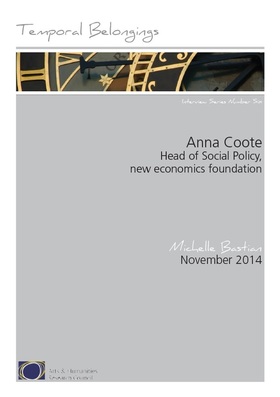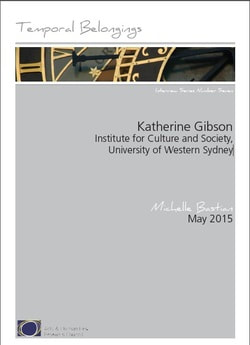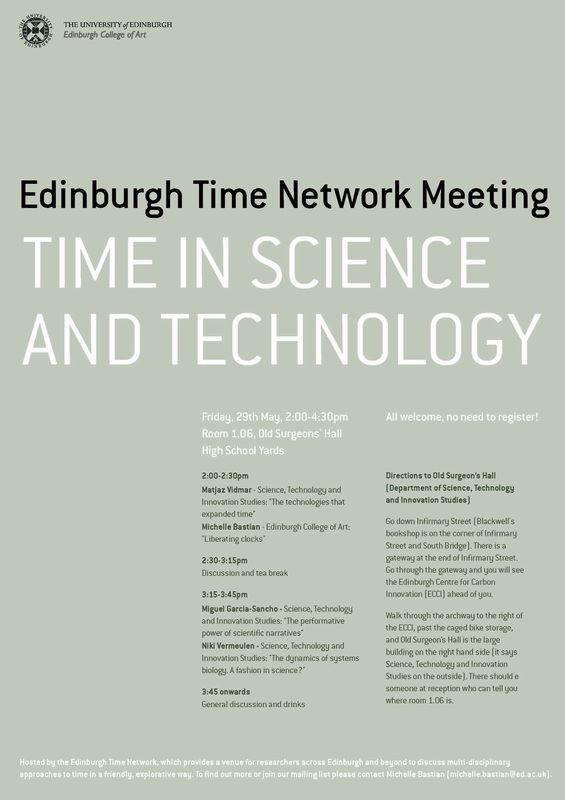 Two further interviews in the Temporal Belongings Series are available. In the first I talk with Anna Coote, Head of Social Policy at the new economics foundation. We focus particularly on her involvement in the 21 hours project and the accompanying edited collection Time on Our Side: Why we all need a shorter working week. In the second interview I talk with Katherine Gibson, an economic geographer and member of the Community Economies Collective about her most recent book Take Back the Economy: An Ethical Guide for Transforming our Communities as J.K. Gibson-Graham and with Jenny Cameron and Stephen Healy. Both are part of the Sustaining Time project, looking at the role of time in building more sustainable economies.
The Edinburgh Time Network was set up following last year's Temporal Design workshop and aims to bring together researchers from across Edinburgh who are working on issues to do with time. We periodically host meetings that explore how time is being looked at in particular schools or disciplines, and this Friday we will be visiting the School of Science, Technology and Innovation Studies. If you'd like to join our mailing list, just send me an email.
Thanks to Miguel Garcia-Sancho for organising the event and Larissa Pschetz for the poster design. This Wednesday the Edinburgh Environmental Humanities Network will be hosting our next event in a series looking at how core research practices might be reshaped from an EH perspective. Following on from Teaching and Writing we will now be looking at Creating. The events is free and everyone welcome. Creating in the Environmental Humanities2 - 5pm, Thursday 14 May 2015 Lecture Theatre O17, Hunter Building Edinburgh College of Art, Lauriston Place, EH3 9DF Twitter Feed: #CitEH Presenters:
Hollis Taylor (violinist/composer, zoömusicologist, University of Technology, Sydney) Creativity, originality, genius: Lessons from zoömusicology How and when does music become possible? Is it a matter of biology, or culture, or an interaction between the two? In this talk (with accompanying video and audio), I challenge the notion that because birdsong serves evolutionary functions, it cannot have aesthetic value and be profitably studied by musicologists. My fieldwork focuses on the song, dance, and art of three species of Australian songbird: the pied butcherbird, the lyrebird, and the bowerbird. While much arts discourse leads us in the direction of creativity, originality, and transcendent genius (and the prestige accorded them), avian aesthetics remind us of the significance of mimicry, borrowing, repetition, and recombinatoriality to the creative process. Jo Mango (singer-songwriter, lecturer, University of the West of Scotland) The Black Sun, The Moth and The Moon: songs in search of a 'domain common to both language and being' This performative talk will explore practice--‐based research centred around two original songs: The Black Sun, which explores possibilities of what Foucault called 'the domain common to both language and being' via meditations on Starling murmurations; and The Moth and the Moon, which attempts to enliven Deleuze and Guattari's notions of 'becoming-other' (the universe singing the bird) with the weaving together of images and sounds associated with embodied knowledge. Rob St. John (artist--‐composer, researcher, University of Glasgow) Sounding the anthropocene: the sonic geographies of complexity, uncertainty and disintegration This talk will discuss the potential of the creative use of environmental sound (particularly birdsong) as a form of experimental geography, where spaces, places and landscapes can be speculatively (re)imagined in response to environmental change, complexity and degradation. It will draw upon a number of recent projects covering work with disintegrating tape loops soaked in polluted river water, birdsong animating a new urban concrete tower, and the sonic geographies of fragmented bird migration routes which follow a similarly disintegrating 19th-century undersea communication cable from the Mediterranean to Britain. Chorus (Respondants): Matt Brennan (Reid School of Music, University of Edinburgh) Peter Nelson (Reid School of Music, University of Edinburgh) After: wine reception To book a place email Andrew Patrizio: [email protected] |
Archives
November 2022
Categories
All
|
||||||||||||||


 RSS Feed
RSS Feed
